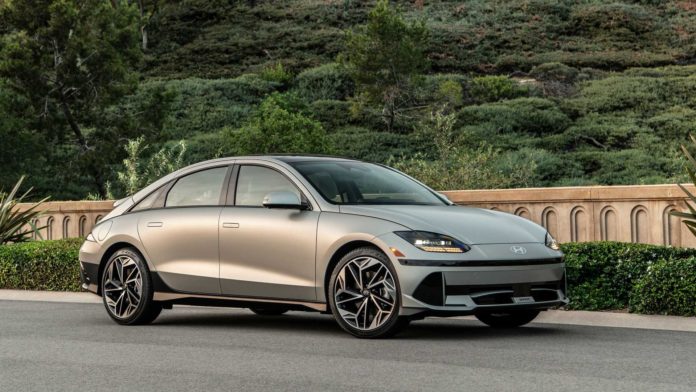Hyundai Motor Company (Hyundai and Genesis brands) reports that its global vehicle sales in December amounted to 347,340 units, which is 4 percent more than a year ago. In 2022, the company sold 3,944,579 vehicles (up 1.4 percent year-over-year), which is a positive outcome in a very challenging time.
The growth in the plug-in car segment is much faster. In December, the combined wholesale shipments (closely related to production) of Hyundai and Genesis plug-in cars amounted to *24,457 (up 31 percent year-over-year). It’s a near-record result (the third consecutive result above 24,000). Plug-in share reached 7 percent of the company’s total wholesale volume.
*Retail sales in South Korea plus wholesale sales (manufacturer level) outside South Korea, unaudited and on a preliminary basis.
**The Hyundai sales report includes sales numbers from the plants in South Korea, Europe (Kona Electric and Tucson PHEV), Indonesia (Ioniq 5), and plants in China and India (both small numbers).
More importantly, all-electric car sales reached the fourth consecutive monthly record of 21,772, which is 43 percent more than a year ago and 6.3 percent of the total volume.
Plug-in hybrid car sales are only a small fraction of the business, far behind all-electric cars, and hydrogen fuel cell cars remain a niche.
Wholesale shipments volume by powertrain type:
- BEVs: 21,772 (up 43%)
- PHEVs: 2,685 (down 22%)
- Total plug-ins: 24,457 (up 31%)
- FCVs: 448 (up 15%)
In the full year, Hyundai Motor Company sold more than 240,000 plug-in electric cars (up 45 percent year-over-year), including nearly 195,000 all-electric (up 56 percent).
Wholesale shipments volume by powertrain type YTD:
- BEVs: 194,835 (up 56%) and 5.0% share
- PHEVs: 45,510 (up 11%) and 1.2% share
- Total plug-ins: 240,345 (up 45%) and 6.1% share
- FCVs: 10,527 (up 9.4%) and 0.3% share

Hyundai brand
The Hyundai brand, which is responsible for the majority of the company’s sales, set another monthly record for both plug-in and all-electric car sales.
The wholesale shipments increased by 31 percent year-over-year to 23,206, including almost 20,521 all-electric cars.
Hyundai wholesale shipments volume by powertrain type:
- BEVs: 20,521 (up 44%)
- PHEVs: 2,685 (down 22%)
- Total plug-ins: 23,206 (up 31%)
- FCVs: 448 (up 15%)

In 2022, Hyundai’s plug-in electric car wholesale shipments amounted to over 221,000, including over 175,000 all-electric cars.
Hydrogen fuel cell vehicles, for the very first time, exceeded 10,000 units in a single year (compared to 9,620 in 2021).
Wholesale shipments volume by powertrain type YTD:
- BEVs: 175,989 (up 44%)
- PHEVs: 45,510 (up 11%)
- Total plug-ins: 221,499 (up 36%)
- FCVs: 10,527 (up 9.4%)

The Hyundai Ioniq 5 remains the top model in Hyundai’s EV lineup. In December, the total volume amounted to 10,311 (a new record, but nothing spectacular compared to the previous results).
Sales of the all-new Hyundai Ioniq 6 gradually increases every month and recently exceeded 4,500.
The company noted that through December, sold over 100,000 Ioniq 5 and Ioniq 6 (customer deliveries as we understand).
“Hyundai was also able to accelerate its transition to electrification last year, thanks to the strong sales of IONIQ 5 and the successful launch of IONIQ 6. The IONIQ 5 and IONIQ 6 together recorded over 100,000 units of global sales in 2022. “
In 2023 the lineup will be joined by the Ioniq 5 N – “the company’s first high-performance EV, with details to be unveiled in the coming months”.
Top models (wholesale shipments) last month (and year-to-date):

The hydrogen fuel cell model — Hyundai NEXO — noted 448 units in December (10,527 YTD).
Genesis brand
In the case of Genesis, the brand’s wholesale shipments of all-electric cars (GV60, GV70 EV, and G80 EV) amounted to 1,251 (up 29 percent year-over-year), including 823 GV60.
Year-to-date Genesis sold 18,846 all-electric cars (up 625 percent year-over-year). The most popular model is the Genesis GV60 (11,031), followed by the Genesis Electrified G80 (4,026) and Genesis Electrified GV70 (3,789).


